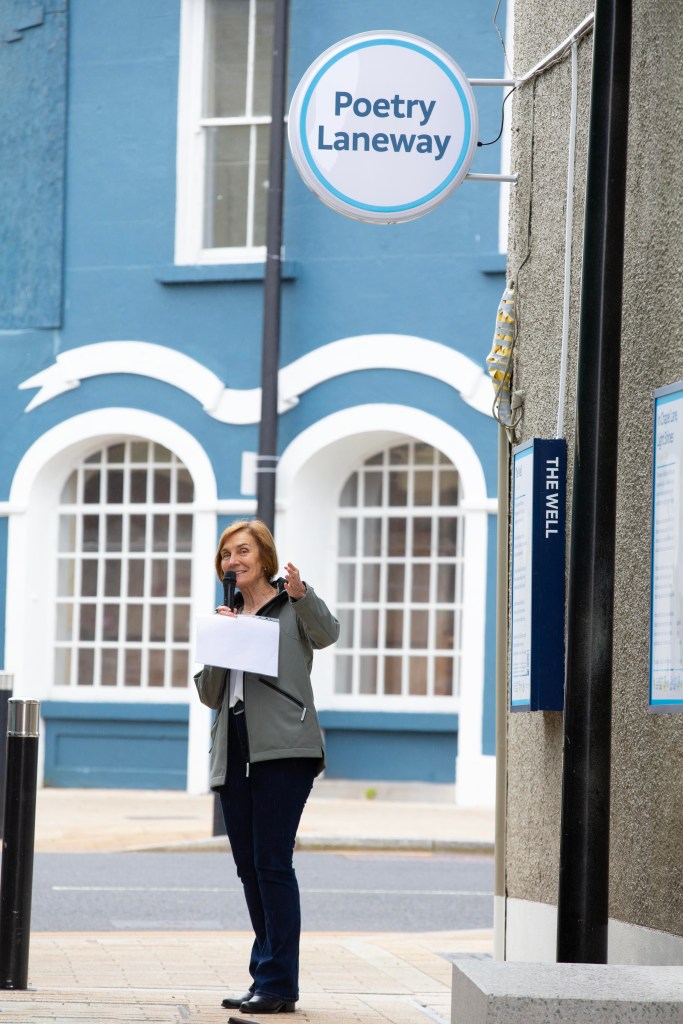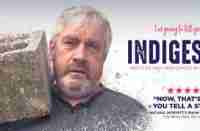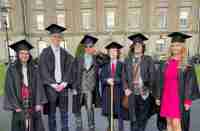In conversation with award-winning Roscommon-born poet Jane Clarke

Award-winning poet and native of County Roscommon Jane Clarke – who now resides with her wife in Glasnevin, County Wicklow – is a highly celebrated Irish artist, whose work has received widespread acclaim over the years. Currently, her poetry is the subject of an ongoing textile art exhibition at Dublin Castle (‘ROOTS: A Dialogue in Textile and Poetry’), which has seen fifteen artists come together to create artwork inspired by Clarke’s words.
Clarke’s previous work includes the publication of three collections and two booklets, and her poetry has received extensive praise and recognition, with the County Roscommon native having received accolades such as the Ireland Chair of Poetry Travel Award, the Hennessy Literary Award for Emerging Poetry, and the Listowel Writers’ Week Poem of the Year at the Irish Book Awards, as well as having been shortlisted and longlisted for a range of prestigious prizes/awards and featured in numerous anthologies.
Speaking to Roscommon People reporter Alannah Ita Healy, Jane Clarke discusses her poetry, her career, and her time living in Roscommon – as well as how these memories has stayed with her over the years.
ALANNAH: Can you talk a bit about your time growing up in Roscommon? Any inspiration you take from that time, etc?
JANE: I grew up on a farm in Fuerty, about four miles from Roscommon town. When I began to write in my early forties I found myself returning in my mind to the fields, the wildflowers, hedges and trees, the turloughs and the River Suck. I realised then that they had shaped my imagination as had the people, animals and farming life of my childhood. My parents were steeped in farming and I did the research for many of my poems around the kitchen table, asking them questions and listening to their stories.
ALANNAH: You’ve mentioned that the titular poem of your first collection ‘The River’ – referring to the River Suck in Roscommon – took seven years to complete. How do you decide when a poem is ‘finished’ or ready to share? Conversely, how do you recognise when a poem is missing something?
JANE: The more I read and write poetry the better I can judge when a poem is finished. I usually write the first draft of a poem quickly and then the slower work of editing begins. I often have a sense that the poem is nearly there, but not quite. Fortunately I have a regular workshop group and other poet friends who read and comment on my work and give suggestions for change. I attribute my development as a poet in no small way to their skilful and insightful feedback.
ALANNAH: In your work, nature is often almost a character in its own right. Can you elaborate on your connection to the natural world and its role in your work? Do you view nature as more of a metaphor or a muse?
JANE: When I began to write poetry it was the natural world that gave me the words and imagery to explore loss and change, memory and the complexity of relationships. Since then my writing has led me to learn more about nature. It is both muse and metaphor to me but more than that I have come to understand that we humans are not separate from nature. We are embedded in our environment and totally dependent on it, whether that is air, water, trees or bees. Poetry can raise our awareness of the miracles of ordinary, everyday nature and thereby motivate us to protect it in whatever way we can.
ALANNAH: Many people from rural Ireland feel a deep connection to their home even when they leave. Is this something you relate to? How does this sense of ‘home’/rural connection permeate your poetry, and how might readers from Roscommon connect to this?
JANE: Yes, home lives on in our hearts and imaginations. Even though home for me is Glenmalure where I’ve lived for almost 30 years, my upbringing in Fuerty is an enduring resource. Readers from Roscommon have often said my poems remind them of the people and ways of life that have shaped them. One word can send us back to a time and a place, one detail can evoke a host of memories. A cool small evening shrunk to a dog bark/and the clank of a bucket – these lines from a Ted Hughes poem carried me back to the farm yard in Fuerty and I began to write ‘Dusk’, a poem in my first collection. I’m reminded of how the poet Thomas McCarthy expresses our attachment to the past: We can love our past not because it was easy but simply because it was ours.
ALANNAH: Your poetry often oscillates between work that feels deeply personal, and writing that speaks to and about the wider world and bigger issues. Is balancing personal expression with universal appeal something you’re cognisant of while writing? Are the themes in your work something you consciously choose, or do they emerge naturally when you write?
JANE: As a young feminist I learned that the personal is political, that our inner world is shaped by the outer world and vice versa. I’ve always been interested in society and issues of social justice and equality as well as our personal lives. It’s inevitable that what matters to us emerges in our writing. Sometimes I consciously choose a theme but most often I see the theme emerge as the poem comes into being or even after it is written. It is strong emotion that stirs a poem in me, whether in response to something intensely personal or something in the wider world.
ALANNAH: In ‘Spalls’ from your third collection, you say your folks would’ve “preferred a husband and children/but their daughter loved a woman”, and in ‘In Glasnevin’, from your second collection, you recall how your grandmother “used to say, there was none of that/in my day” – lines I find powerfully yet succinctly capture a particularly Irish brand of heteronormativity and queer erasure. Given how much our social norms and social history have omitted queerness, how conscious are you of writing into those gaps? What are you hoping to communicate when you do?
JANE: I don’t begin a poem with a message in mind. I write what I have to write and what in that moment I am able to write because of how I am stirred emotionally. I’m happy when a poem speaks to others of their lives. Ireland has become a much more open and inclusive country since I was a child but there are still many people who live in fear and denial about sexual identity. Queer people are still censored and we censor ourselves as a form of self-protection. Civil Partnership and Marriage Equality made a fundamental difference to my writing. It was as if my country said at last, yes, you belong here. That in turn freed my creativity. I hope that some of my poems reach out to queer people and their families and friends. Seeing our lives represented in literature and other art forms gives us courage to be ourselves in all our diversity.
ALANNAH: The ongoing ROOTS exhibit at Dublin Castle comprises art by fifteen artists, inspired by your work. What was it like seeing your poetry interpreted visually? Did any of the works surprise you?
JANE: I was stunned when I first saw the exhibition; the beauty and diversity of the work and the depth of meaning. Each artist chose one or two of my poems as an inspiration and in all they have created fifty works of art. I am honoured that my poems sparked their creations. Over 12,000 people have visited the exhibition already and their positive responses have been overwhelming. It’s wonderful that people of all ages and from all over the country and beyond are visiting. Many go back a second time, finding the combination of visual art and poetry profoundly moving.
ALANNAH: When it comes to reading poetry and other forms of writing yourself, what type of work are you drawn to? Are there specific themes, genres, or writers you find yourself returning to, and why?
JANE: Reading makes me want to write and teaches me how to write better. I begin work every morning with reading, mostly poetry but I always have a few other books on the go, often nature writing and history. I love anthologies where I can find poems from all over the world with a wide range of themes and styles. I am usually drawn to poems that are distilled to a kind of simplicity and clarity and are musical, visual and maybe a little mysterious. The novel I’m reading at the moment, Abraham Verghese’s The Covenant of Water, reminds me of reading George Eliot, Jane Austin and Thomas Hardy when I was young; the wonder of a well-told story that helps us imagine other lives and places.
ALANNAH: What challenges have you faced as a poet, whether creatively, personally, or professionally?
JANE: You’re a perpetual beginner as a writer and so the next book, even the next poem, is always a challenge. There’s often a sense of failure and rejections are inevitable. I had to make difficult decisions along the way in order to carve out time for writing but I’d say the most difficult time was when I had finished my first collection and was looking for a publisher. I was very fortunate to have my work accepted by Bloodaxe Books. My editor’s commitment to and interest in my poetry ever since has given me a sense of security which allows me to spread my wings as a writer.
ALANNAH: Has your perspective on poetry and its purpose evolved over the course of your career?
JANE: Now I see that poetry serves many purposes. It gives pleasure, expresses emotion that can’t be conveyed in other ways, helps us understand ourselves and each other, reminds us that we are not alone in either our joys or struggles. It can also bear witness to injustice, inequality and violence. I’ve read powerful collections this year inspired by environmental loss here and abroad as well as the genocide in Gaza and the war in Ukraine. A poem is a small thing but it can reach far and wide.
ALANNAH: Are there any projects you are working on currently?
JANE: I’m working on my fourth collection at the moment with a view to publication in 2026. I’m also editing an illustrated book of poetry and prose on the theme of connecting with nature.
ALANNAH: Looking back on your career, is there a particular poem, collection, or project you’re most proud of, and why?
JANE: Every poem and every publication is important to me but my first collection will always have a special place in my heart because of that girl growing up on a farm in Fuerty who loved reading and dreamed of writing a book. I put the dream aside until my early forties when I wrote my first poem. Ten years later The River went out into the world and was read and loved. That book led to all the others.






